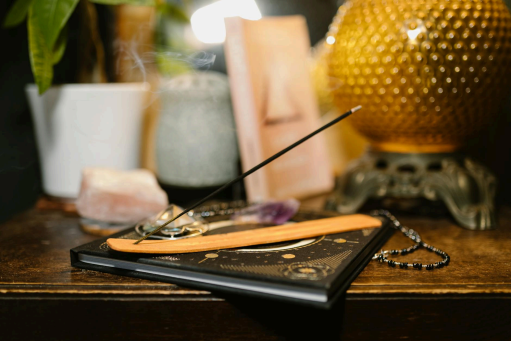Have you ever had a gut feeling about something, only to ignore it and later regret your decision? That nagging sensation, often dismissed as mere coincidence, might be your intuition trying to guide you. In a world filled with constant noise and distractions, learning to trust that inner voice can be a game-changer.
Intuitive awareness isn't just a mystical concept reserved for psychics and fortune-tellers. It's a powerful tool that everyone possesses, waiting to be harnessed. By developing this innate ability, you can make better decisions, navigate complex situations with ease, and tap into a wellspring of inner wisdom. But how do you start trusting that elusive voice within?
In this blog post, we'll explore the fascinating world of intuitive awareness and provide you with practical steps to strengthen your connection with your inner guide. From understanding what intuition truly is to advanced techniques for fine-tuning your intuitive skills, we'll cover everything you need to know. Get ready to embark on a journey of self-discovery and unlock the potential of your intuition! 🌟
Intuition is often described as a "gut feeling" or an inner knowing that occurs without conscious reasoning. It plays a crucial role in decision-making by providing rapid, subconscious insights based on past experiences and pattern recognition. Intuitive awareness allows us to tap into this valuable source of information, enhancing our ability to make quick and effective decisions in various aspects of life.
Aspect | Intuition | Instinct |
Origin | Learned experiences | Innate, biological responses |
Flexibility | Adaptable | Fixed |
Consciousness | Subconscious | Unconscious |
Complexity | Can handle complex situations | Primarily basic survival |
Benefits of developing intuitive awareness
1. Improved decision-making
2. Enhanced problem-solving skills
3. Increased creativity and innovation
4. Better emotional intelligence
5. Stronger connection with oneself and others
Common misconceptions about intuition
Myth: Intuition is always accurate
Reality: Intuition can be influenced by biases and emotions
Myth: Intuition is a mystical or supernatural ability
Reality: It's a natural cognitive process based on pattern recognition and experience
Developing intuitive awareness requires practice and self-reflection. By understanding its nature and benefits, we can harness this powerful tool to navigate life's challenges more effectively. As we move forward, we'll explore how to recognize your intuitive voice and distinguish it from other mental chatter.

Recognizing Your Intuitive Voice
Now that we understand what intuitive awareness is, let's explore how to recognize your intuitive voice. This crucial step will help you differentiate between your intuition and other mental processes.
Identifying intuitive thoughts vs. rational thoughts
Intuitive thoughts often come suddenly and feel like a "knowing" rather than a logical conclusion. They tend to be:
- Quick and effortless
- Based on incomplete information
- Difficult to explain rationally
Rational thoughts, on the other hand, are:
- Slower and more deliberate
- Based on analysis and evidence
- Easier to explain and justify
Intuitive Thoughts | Rational Thoughts |
Sudden and spontaneous | Deliberate and analytical |
Based on gut feelings | Based on logical reasoning |
Often unexplainable | Can be explained step-by-step |
Physical sensations associated with intuition
Your body often provides clues when your intuition is speaking. Common physical sensations include:
- A flutter in your stomach (the "gut feeling")
- Goosebumps or chills
- Sudden changes in energy levels
- A sense of lightness or heaviness in your chest
Emotional cues that signal intuitive guidance
Intuition can also manifest through emotional responses:
- A sense of calm or peace about a decision
- Excitement or enthusiasm without apparent reason
- A feeling of "rightness" or alignment
- Unexplained anxiety or unease about a situation
Distinguishing between fear-based and intuition-based decisions
It's crucial to differentiate between genuine intuition and fear-based reactions. Intuition-based decisions typically feel:
- Calm and centered, even if challenging
- Aligned with your values and goals
- Focused on growth and possibilities
Fear-based decisions often feel:
- Panicked or urgent
- Rooted in past traumas or insecurities
- Focused on avoiding perceived threats
Next, we'll explore techniques to cultivate a stronger connection with your intuition, building on your ability to recognize its voice.

Cultivating a Stronger Connection with Your Intuition
Now that we've explored how to recognize your intuitive voice, let's delve into methods for strengthening your connection with your intuition. By incorporating these practices into your daily life, you'll find it easier to tap into your inner wisdom and trust your gut instincts.
Practicing mindfulness and meditation
Mindfulness and meditation are powerful tools for developing intuitive awareness. These practices help quiet the mind, allowing your intuition to surface more easily. Try incorporating a daily 10-minute meditation session into your routine, focusing on your breath and observing your thoughts without judgment.
Keeping an intuition journal
Maintaining an intuition journal can help you track and validate your intuitive insights. Record your gut feelings, dreams, and any sudden insights you experience. Over time, you'll notice patterns and improve your ability to recognize intuitive messages.
Engaging in creative activities Creativity opens channels to your subconscious mind, enhancing intuitive abilities. Consider these activities:
- Painting or drawing
- Writing fiction or poetry
- Dancing or movement exercises
- Playing a musical instrument
Spending time in nature
Nature provides a nurturing environment for intuitive growth. Regular outdoor activities can help you:
- Reduce stress
- Increase mindfulness
- Enhance sensory awareness
- Connect with your inner self
Reducing external noise and distractions
Minimizing external distractions allows your intuition to speak more clearly. Try these techniques:
Technique | Benefits |
Digital detox | Reduces information overload |
Silent retreats | Deepens self-reflection |
Decluttering | Creates mental space |
Limiting social media | Reduces external influences |
By consistently practicing these methods, you'll cultivate a stronger connection with your intuition, making it easier to trust and act upon your inner guidance. Next, we'll explore how to confidently act on your intuitive insights in various aspects of your life.

Trusting and Acting on Your Intuitive Insights
Now that you've learned to recognize your intuitive voice, it's time to explore how to trust and act on those insights. This crucial step can be challenging, but it's essential for developing your intuitive awareness.
Overcoming self-doubt and skepticism
Self-doubt is often the biggest hurdle when trusting your intuition. To overcome this:
- Practice self-compassion and positive self-talk
- Keep an intuition journal to track your insights and their outcomes
- Surround yourself with supportive people who encourage your intuitive growth
Balancing intuition with logical thinking
While intuition is valuable, it's important to find a balance with rational thought:
Intuition | Logical Thinking |
Quick, gut feelings | Analytical, step-by-step process |
Based on subconscious patterns | Based on conscious reasoning |
Holistic understanding | Detailed examination |
Aim to use both in decision-making for a well-rounded approach.
Taking small steps to build confidence in your intuition
Building trust in your intuition is a gradual process:
1. Start with low-stakes decisions
2. Act on your intuitive hunches in safe environments
3. Gradually increase the importance of decisions guided by intuition
4. Celebrate small successes to reinforce your trust
Learning from intuitive successes and failures
Every intuitive experience is an opportunity for growth:
- Analyze the outcomes of your intuitive decisions
- Reflect on what factors influenced your intuition
- Adjust your approach based on these insights
- Remember that even "failures" provide valuable learning experiences
By consistently practicing these strategies, you'll develop a stronger trust in your intuitive voice and learn to act on your insights with greater confidence.
 Enhancing Intuitive Awareness in Daily Life
Enhancing Intuitive Awareness in Daily Life
Now that we've explored ways to cultivate a stronger connection with your intuition, let's dive into how you can enhance your intuitive awareness in various aspects of your daily life.
Incorporating intuitive decision-making at work
Integrating intuition into your professional life can lead to more confident and effective decision-making. Here are some ways to leverage your inner knowing in the workplace:
- Practice active listening during meetings
- Take brief moments of silence before making important decisions
- Trust your gut feeling about potential collaborations or projects
Intuitive Technique | Workplace Application |
Visualization | Imagine successful outcomes for presentations |
Body scanning | Check for physical sensations before important conversations |
Journaling | Record and reflect on work-related hunches |
Using intuition to improve relationships
Intuition can be a powerful tool in nurturing and strengthening personal connections. Consider these approaches:
1. Pay attention to your initial impressions when meeting new people
2. Listen to your inner voice when navigating conflicts
3. Trust your instincts about the dynamics in group settings
Applying intuitive awareness to health and well-being
Your intuition can be a valuable guide in maintaining your physical and mental health: Listen to your body's signals about food choices and exercise
Use meditation to tune into your inner wisdom about self-care needs
Trust your intuition when something feels "off" with your health
Leveraging intuition for personal growth and self-discovery
Intuitive awareness can be a catalyst for profound personal development:
1. Follow intuitive nudges towards new experiences or learning opportunities
2. Use dream journaling to tap into subconscious insights
3. Practice mindfulness to enhance your connection with your inner guidance
By consistently applying these techniques, you'll find your intuitive awareness becoming an integral part of your daily life, leading to more authentic and fulfilling experiences across all areas.

Advanced Techniques for Developing Intuitive Awareness
As we delve deeper into intuitive development, let's explore some advanced techniques that can significantly enhance your intuitive awareness.
Energy Healing and Chakra Balancing
Energy healing and chakra balancing can open up your intuitive channels. By aligning your energy centers, you create a clearer pathway for intuitive insights to flow.
Chakra | Associated Intuitive Ability |
Third Eye | Clairvoyance, Intuitive Vision |
Throat | Clairaudience, Inner Voice |
Heart | Emotional Intuition, Empathy |
Exploring Divination Tools
Divination tools like tarot cards and runes can serve as powerful intuition amplifiers. These tools act as mirrors, reflecting your subconscious knowledge and intuitive insights.
- Tarot: Helps tap into visual and symbolic intuition
- Runes: Enhances tactile and energetic intuition
- Pendulum: Strengthens yes/no intuitive responses
Practicing Lucid Dreaming and Dream Interpretation
Lucid dreaming allows you to consciously explore your subconscious mind, a rich source of intuitive wisdom. Dream interpretation, on the other hand, helps you decode the symbolic language of your intuition.
Engaging in Body-Mind Practices
Practices like yoga and tai chi integrate body awareness with mental focus, creating an ideal state for intuitive reception.
- Yoga: Enhances mind-body connection and energy flow
- Tai Chi: Improves energy awareness and inner balance
- Qigong: Strengthens intuitive energy perception
By incorporating these advanced techniques into your practice, you'll find your intuitive abilities expanding to new levels of clarity and reliability.

Developing intuitive awareness is a transformative journey that empowers you to tap into your inner wisdom and make more aligned decisions. By understanding the nature of intuition, recognizing its subtle cues, and cultivating a stronger connection with your inner voice, you can harness this powerful tool in your daily life. Trusting and acting on your intuitive insights, while consistently practicing techniques to enhance your awareness, will lead to a more authentic and fulfilling life experience.
As you continue to develop your intuitive abilities, remember that it's a lifelong process of growth and self-discovery. Embrace the journey with patience and curiosity, and allow your intuition to guide you towards your highest potential. By nurturing this innate wisdom, you'll find yourself navigating life's challenges with greater ease and confidence, ultimately leading to a more harmonious and purposeful existence.









.jpg)
.png)
.gif)

0 Comments